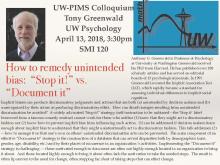Implicit biases can produce discriminatory judgments and actions that are both (a) unintended by decision makers and (b) unrecognized by their actors as producing discriminatory effect. How can disadvantages resulting from unintended discrimination be avoided? A widely advocated ‘Stop it!” strategy, (self-instruction to be unbiased—the ‘Stop it’ label borrowed from a famous comedy routine) cannot work for those who neither (1) know that they might act in discriminatory fashion nor (2) know how to prevent implicit bias from influencing such action. (1) can be addressed if decision makers learn enough about implicit bias to understand that they might unintentionally act in discriminatory fashion. This talk addresses (2)—how to arrange it so that one’s own or others’ unintended discrimination acts can be prevented. The main component of an effective “Document it” strategy is the construction of a database that can reveal disparities both by demographics (race, gender, age, disability, etc.) and by their places of occurrence in an organization ’s activities. Implementing the “Document it” strategy is challenging — those motivated enough to document are often not highly enough located in an organization to bring it about. And those located highly enough to bring it about often lack the motivation to take the needed steps. The result is often lip service to the need for change, often stopping far short of taking steps that can effect change.
Anthony G. Greenwald is Professor of Psychology at University of Washington Greenwald received his PhD from Harvard. He has published over 180 scholarly articles and has served on editorial boards of 13 psychological journals. In 1995 Greenwald invented the Implicit Association Test (IAT), which rapidly became a standard for assessing individual differences in implicit social cognition.
